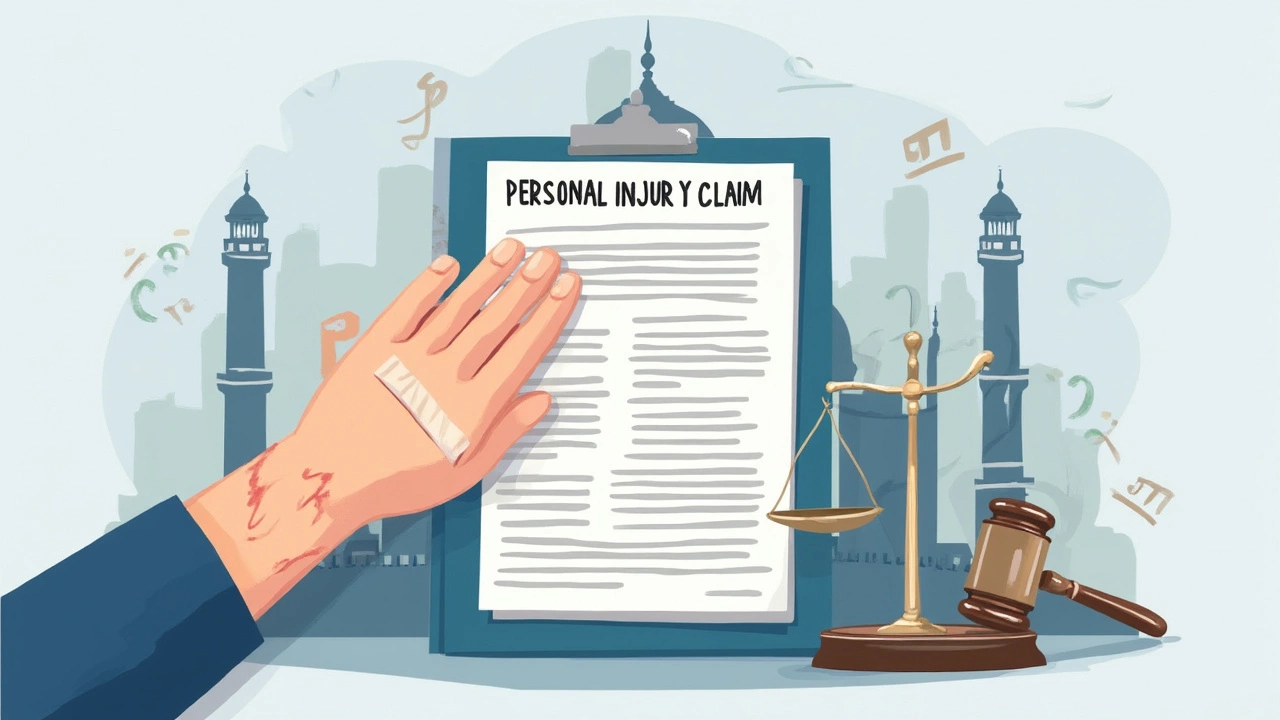Ever notice how "personal injury" means different things depending on who you ask? Google gives you one idea, but walk into a law office and they throw around something called "Black's Law Definition." This isn’t some secret code—it’s basically the gold standard lawyers use to define stuff.
Here’s the thing. When you’re hurt—physically, mentally, whatever—the exact words lawyers use can decide whether your case flies or gets booted out. That’s why knowing what Black’s Law Dictionary says matters. It shapes how judges, juries, and insurance folks see your story. Handy, right?
If you’ve ever wondered if a bad back from a car crash, or anxiety after a nasty fall, counts as personal injury in the eyes of the law, you’re in the right spot. This article clears up the lawyer talk and shows what really counts as a personal injury. No guessing. No confusion. Just the info you actually need.
- Where the Black Law Definition Comes From
- What Personal Injury Really Means Legally
- Why This Definition Matters in Your Case
- Tips for Talking to a Lawyer About Personal Injury
Where the Black Law Definition Comes From
So, who is this Black guy and why do lawyers care what he said? Black’s Law Dictionary is basically the legal world’s go-to book for definitions. It was first put together in 1891 by Henry Campbell Black, a lawyer with a knack for making legal terms way less mysterious. This dictionary isn’t just for show—courts, lawyers, even law students use it every day to settle arguments about what words really mean in the law.
Over the years, Black’s Law Dictionary has gone through a bunch of editions, with the most recent 11th edition dropping in 2019. Think of it like the Oxford Dictionary, but for law. When someone says “the Black law definition of personal injury,” they usually mean the exact wording or meaning found in this dictionary—not just what you’d find in a quick web search.
Here’s where it gets interesting: legal arguments often come down to splitting hairs over words. Judges don’t just make up definitions, they look to authorities like Black’s. If you’re working on a personal injury claim, courts might actually quote from Black’s Law Dictionary in their decisions. That’s a big deal because it means your case hinges on how this dictionary frames what happened to you.
For the numbers people, check out this table for a snapshot on just how often Black’s Law Dictionary shows up in legal work:
| Edition | Year Released | Court Citations |
|---|---|---|
| 1st | 1891 | 5,400+ |
| 6th | 1990 | 12,200+ |
| 11th | 2019 | Est. 2,000+ (and counting) |
The takeaway? When you hear "Black law definition," it’s not just some random phrase. It’s the law world’s way of setting the record straight on what counts and what doesn’t when you’re talking about personal injury.
What Personal Injury Really Means Legally
If you grab a copy of Black’s Law Dictionary and look up “personal injury,” you’ll see it means any harm done to a person’s body, mind, or emotions—not stuff you own. So a broken leg, a concussion, even PTSD from an accident qualifies. But cracking your phone or wrecking your car? That’s property damage, not personal injury.
Black’s Law Dictionary is like the playbook for lawyers and judges. When they need to spell out what “personal injury” actually covers, they turn to this definition. One important detail: the harm can be physical (like whiplash from a car accident) or non-physical (like anxiety after being threatened at work). The injury has to be caused by someone else’s action—or sometimes, their failure to act responsibly.
If you want to see what counts in real cases, courts usually stick close to the dictionary’s wording. Physical injuries are the most obvious: broken bones, sprains, burns, cuts, or illnesses from toxic exposure. But emotional or psychological injuries can count too, as long as there’s proof—like a diagnosis for trauma after a scary event.
- Physical injuries: sprains, fractures, burns, anything that hurts your body
- Mental injuries: anxiety, depression, PTSD, or sleep issues triggered by an incident
- No property losses: just harm to your body, mind, or emotions
On the legal side, if you’re wondering, "Do I have a personal injury claim?"—the dictionary definition packs a punch. If you suffered harm, it was caused by someone’s carelessness or recklessness, and you have some kind of loss (like medical bills, lost work, or emotional trauma), then you’re right in the personal injury law ballpark. Courts are strict about keeping the lines clear, so only injuries to the person—not belongings—go under this label.

Why This Definition Matters in Your Case
Getting the definition of personal injury right isn’t just a detail—it can make or break your case. Courts, insurance companies, and lawyers all use Black’s Law Dictionary as the go-to source for what counts and what doesn’t. If you’re filing a claim, and your injury doesn’t match this definition, the other side can argue you’re not even eligible for compensation.
Black’s Law Dictionary spells it out simply: personal injury is “any harm caused to a person, such as a broken bone, a cut, or a bruise; also includes mental or emotional harm (such as fright or anxiety).” Sounds straightforward, but there’s a catch—if you only have damage to your stuff (like your car), that doesn’t count as personal injury. Physical and mental harm to your actual body or mind is what matters in court.
Here’s where things get real. Insurance companies are picky. Settlements for personal injury cases are often based on whether your pain, suffering, or trauma is recognized under this definition. No proof? No payout.
“Courts reference Black’s Law Dictionary because it provides consistency and clarity to legal arguments,” says the American Bar Association. “Definitions matter when you’re drawing the line on what claims are valid.”
Check out some numbers from a 2023 insurance survey:
| Type of Complaint | Median Settlement | Recognized as Personal Injury? |
|---|---|---|
| Physical injury (e.g. broken bone) | $27,800 | Yes |
| Emotional distress (verified by psychologist) | $14,900 | Yes |
| Property damage only | $2,300 | No |
If you’re unsure about your type of harm, here’s a quick breakdown:
- If you can show medical records or expert opinions, your case fits the personal injury bucket.
- Damaged property doesn’t qualify—don’t waste time arguing it as injury to you.
- Mental effects count, but you’ll need more than just your word. Documentation is everything.
The big takeaway: The Black’s Law definition draws the fence around what counts as personal injury. Stay inside that fence, and you’ve got a shot at real compensation. Step outside, and your claim might never even see a courtroom.
Tips for Talking to a Lawyer About Personal Injury
If you’re about to meet a personal injury lawyer, don’t just show up with a sad story. Bring your facts and questions. That’s how you get real answers, not a fancy sales pitch.
First, know why you’re there. The definition of personal injury isn’t just about a broken arm—it covers physical pain, mental stress, lost wages, and even changes to how you live day-to-day. Black’s Law Dictionary literally spells it out as an injury to the body, mind, or emotions, not just your stuff. So be specific when you talk about what happened and how it’s affected you.
- Gather docs: Bring medical records, accident reports, and photos. If you’ve kept a journal of pain or symptoms, even better.
- Timeline matters: Lawyers need dates—when the accident happened, when you saw the doctor, when symptoms changed. Don’t guess. Jot them down ahead of your meeting.
- Be honest about prior injuries: Hiding old injuries can wreck your case, because insurance companies usually dig up your medical history.
- Ask about their track record: Don’t be shy. How many cases like yours have they handled? What do typical payouts look like?
Want some stats to see if you’re alone? Check this out:
| Type of Personal Injury | Average Settlement (USD) | Common Cause |
|---|---|---|
| Car Accident | $24,000 | Rear-end, T-bone, etc. |
| Slip and Fall | $15,000 | Wet floors, icy sidewalks |
| Dog Bite | $40,000 | Home or public space |
Timing makes a difference too. Most states set a deadline—called a statute of limitations—for filing a personal injury lawsuit. In a lot of places, it’s two years. Wait too long, and there’s nothing even the best lawyer can do.
Cut the small talk. Just ask straight up: "How does the Black’s Law definition affect my case?" If they can’t answer that in plain English, it’s a red flag. You want a lawyer who knows the rules and can actually explain them without hiding behind legal mumbo-jumbo.
